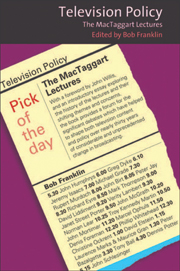Book contents
- Frontmatter
- Contents
- Acknowledgements
- Foreword
- Introduction
- The James MacTaggart Lectures
- TV Drama: The Case against Naturalism
- Naturalism and Television
- Taboos in Television
- Signposting Television in the 1980s: The Fourth Television Channel
- Television Drama, Censorship and the Truth
- The Day after Tomorrow: The Future of Electronic Publishing
- The Primacy of Programmes in the Future of Broadcasting
- Reflections on Working in Film and Television
- ‘Opening up the Fourth Front’: Micro Drama and the Rejection of Naturalism
- Power and Pluralism in Broadcasting
- Ethics, Broadcasting and Change: The French Experience
- Freedom in Broadcasting
- Deregulation and Quality Television
- The Future of Television: Market Forces and Social Values
- The Future of the BBC
- Occupying Powers
- A Culture of Dependency: Power, Politics and Broadcasters
- Talent versus Television
- A Glorious Future: Quality Broadcasting in the Digital Age
- Rewarding Creative Talent: The Struggle of the Independents
- Television versus the People
- Public-Interest Broadcasting: A New Approach
- A Time for Change
- The Soul of British Television
- Television's Creative Deficit
- Freedom of Choice: Public-Service Broadcasting and the BBC
- First Do No Harm
- Appendix A Edinburgh International Television Festival, 29 August–2 September 1977: Programme
- Appendix B Précis of Ted Turner, James MacTaggart Lecture 1982; Dr Jonathan Miller, James MacTaggart Lecture 1983
- Index
The Day after Tomorrow: The Future of Electronic Publishing
from The James MacTaggart Lectures
Published online by Cambridge University Press: 05 August 2013
- Frontmatter
- Contents
- Acknowledgements
- Foreword
- Introduction
- The James MacTaggart Lectures
- TV Drama: The Case against Naturalism
- Naturalism and Television
- Taboos in Television
- Signposting Television in the 1980s: The Fourth Television Channel
- Television Drama, Censorship and the Truth
- The Day after Tomorrow: The Future of Electronic Publishing
- The Primacy of Programmes in the Future of Broadcasting
- Reflections on Working in Film and Television
- ‘Opening up the Fourth Front’: Micro Drama and the Rejection of Naturalism
- Power and Pluralism in Broadcasting
- Ethics, Broadcasting and Change: The French Experience
- Freedom in Broadcasting
- Deregulation and Quality Television
- The Future of Television: Market Forces and Social Values
- The Future of the BBC
- Occupying Powers
- A Culture of Dependency: Power, Politics and Broadcasters
- Talent versus Television
- A Glorious Future: Quality Broadcasting in the Digital Age
- Rewarding Creative Talent: The Struggle of the Independents
- Television versus the People
- Public-Interest Broadcasting: A New Approach
- A Time for Change
- The Soul of British Television
- Television's Creative Deficit
- Freedom of Choice: Public-Service Broadcasting and the BBC
- First Do No Harm
- Appendix A Edinburgh International Television Festival, 29 August–2 September 1977: Programme
- Appendix B Précis of Ted Turner, James MacTaggart Lecture 1982; Dr Jonathan Miller, James MacTaggart Lecture 1983
- Index
Summary
Peter Jay criticises the current overregulation of broadcasting and outlines a possible future organisation for what he prefers to describe as ‘electronic publishing’: his assumption is that the problem of ‘spectrum scarcity’, which provided the original rationale for regulation, has been overcome. ‘Within less than two decades,’ he argues, we will inhabit ‘a world in which there will be no technically based grounds for government interference in electronic publishing.’
Jay sets out his vision. Every household will be connected by an interactive fibre optic link which allows ‘the nation's viewers’ to ‘simultaneously watch as many different programmes as the nation's readers can read different books, magazines and newspapers’. The television becomes like a telephone. Viewers dial to select programmes, a meter monitors quantity and kind of programmes selected and the television set is connected to a ‘central black box’ which is fed with ‘an indefinitely large number of programmes’ and which is maintained by British Telecom. Consumers buy programmes on a pay-to-view basis.
Jay believes this future form of electronic publishing will encapsulate and reflect in its structures, the principles of consumer sovereignty, freedom and choice. It requires no regulatory laws other than the general provisions for libel, copyright and obscenity, which already govern publishing. The state may wish to continue ‘to subsidise any particular categories of electronic publishing which are considered virtuous or in the public interest’.
- Type
- Chapter
- Information
- Television PolicyThe MacTaggart Lectures, pp. 79 - 88Publisher: Edinburgh University PressPrint publication year: 2005



